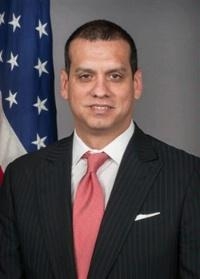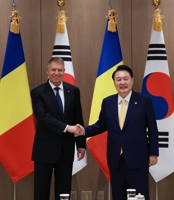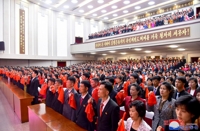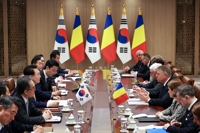(ITU) (Yonhap Interview) U.S. aims to narrow digital divide through ITU
By Kang Yoon-seung
BUSAN, Oct. 22 (Yonhap) -- The United States hopes to narrow the digital divide around the world to give people the opportunity to create a future for themselves, even those living under authoritarian rule, its chief delegate to the International Telecommunications Union (ITU) conference said.
"The main goal of the United States government... is to ensure the ITU and its member states focus on bridging the digital divide," said Daniel Sepulveda, Deputy Assistant Secretary of U.S. Bureau of Economic and Business Affairs, in an interview with Yonhap News Agency on Tuesday.
"There are too many people, from Latin America, Africa and parts of Southeast Asia, that are not connected to the Internet... That is why the ITU was created, it was to connect human beings to each other over telecommunications network," Sepulveda said.
The chief delegate said while the ITU may not be able to provide Internet to authoritarian regimes like North Korea, as it is not a law enforcement agency, it can still make changes by creating a new environment.
"There are regimes that are not democratic in nature. There are places in the world where people are not free to express themselves. Those regimes want to use the power of the ITU to create standards of technologies that enable that activity and to approve it." Sepulveda said.
"We will not grant consensus to either of those things. Neither will the vast majority of the democratic world," he added. "We believe in the freedom to express yourself."
"We are not here to determine their (people's) future. We are here to give them opportunity to fulfill the future for themselves," he said.
Sepulveda did not respond to questions about Seoul's policies toward Pyongyang or the recently flared controversy in Seoul about state monitoring of online platforms, calling the issues "domestic."
Daum Kakao, operator of South Korea's top messenger service Kakao Talk, said it will not grant state access to chat records of its users, defying the prosecution who warned it will investigate malicious and false rumors circulating on social network services.
The prosecution's move caused users of Kakao Talk to switch over to other messenger services in droves and sparked a debate over the scope of freedom online.
"In the United States, you are free to speak your mind. You are free to criticize the government, you are free to say what you wish. But freedom is not limitless. For example, we have laws against child pornography," he said.
"Just because you do something on the Internet does not make it legal. If it is illegal off the Internet, it is illegal online."
Sepulveda, meanwhile, expressed support for the next head of the ITU.
ITU Secretary General Hamadoun Toure's term ends this year, with the election for the next head set for Thursday. Houlin Zhao, a China-born ITU deputy secretary general, is expected to succeed him.
"He (Zhao) is an extremely competent and honest man. And we expect that working relationship will continue as it has always been," Sepulveda said, adding he supports a proposal made by Brazil that draws a clearer line between the role of ITU's secretary general and the deputy.
The U.S. official stressed that for the next four years, the ITU should focus on creating a legal and regulatory environment that encourages investment in telecommunication.
"We also support the idea that all data (for the ITU meeting) should be open. You shouldn't have to pay to access to the work of the union. Any academic, any interested person, should have access," he added.
colin@yna.co.kr
(END)
-
 S. Korea marks 30th anniv. of Korean Pavilion at Venice Biennale with contemporary art
S. Korea marks 30th anniv. of Korean Pavilion at Venice Biennale with contemporary art -
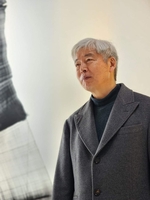 Artist Lee Bae captures ethereal Korean aesthetics at Venice Biennale
Artist Lee Bae captures ethereal Korean aesthetics at Venice Biennale -
 Ateez member Yunho throws first pitch at MLB match between Dodgers, Mets
Ateez member Yunho throws first pitch at MLB match between Dodgers, Mets -
 Gov't likely to accept university chiefs' request to lower med school enrollment quota
Gov't likely to accept university chiefs' request to lower med school enrollment quota -
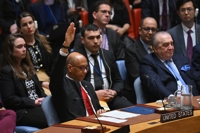 S. Korea supports resolution backing U.N. membership of Palestine
S. Korea supports resolution backing U.N. membership of Palestine
-
 Artist Lee Bae captures ethereal Korean aesthetics at Venice Biennale
Artist Lee Bae captures ethereal Korean aesthetics at Venice Biennale -
 S. Korea marks 30th anniv. of Korean Pavilion at Venice Biennale with contemporary art
S. Korea marks 30th anniv. of Korean Pavilion at Venice Biennale with contemporary art -
 Gov't likely to accept university chiefs' request to lower med school enrollment quota
Gov't likely to accept university chiefs' request to lower med school enrollment quota -
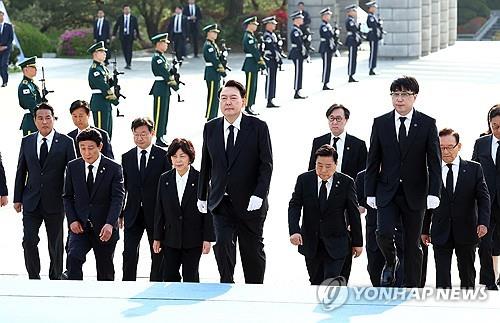 Yoon's approval rating sinks to lowest point since taking office
Yoon's approval rating sinks to lowest point since taking office -
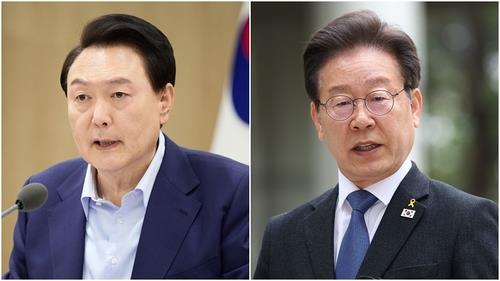 (LEAD) Yoon proposes first-ever meeting with opposition leader
(LEAD) Yoon proposes first-ever meeting with opposition leader
-
 (LEAD) N. Korea sends economic delegation to Iran amid suspected military cooperation
(LEAD) N. Korea sends economic delegation to Iran amid suspected military cooperation -
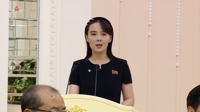 N.K. leader's sister slams joint S. Korea-U.S. military drills
N.K. leader's sister slams joint S. Korea-U.S. military drills -
 Author of ADOR's 'internal document' refutes allegations of spinoff plot
Author of ADOR's 'internal document' refutes allegations of spinoff plot -
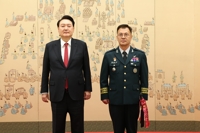 Yoon says N. Korea must not dare challenge S. Korea
Yoon says N. Korea must not dare challenge S. Korea -
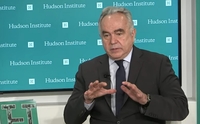 U.S. will take steps for three-way engagement on nuclear deterrence with S. Korea, Japan: Campbell
U.S. will take steps for three-way engagement on nuclear deterrence with S. Korea, Japan: Campbell
